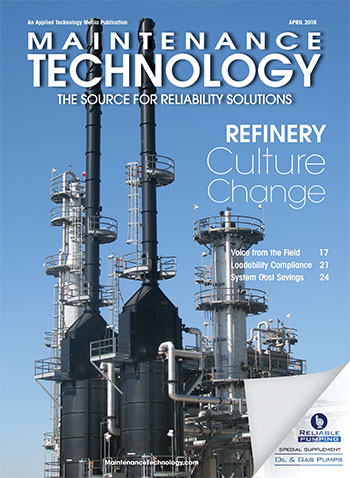
By Dr. Lube, aka Ken Bannister
Symptom:
After running a newly purchased hydraulic system for several weeks, we’ve noticed that two of the cylinder seals are leaking. How can this happen in brand-new equipment? Continue Reading →

By Dr. Lube, aka Ken Bannister
Symptom:
After running a newly purchased hydraulic system for several weeks, we’ve noticed that two of the cylinder seals are leaking. How can this happen in brand-new equipment? Continue Reading →

By Ken Bannister, Contributing Editor
Symptom:
Dear Dr. Lube: While changing out unreadable sight-gauges on some large gearbox reservoirs, we discovered a wall of sludge in the tank bottoms. Is it preventable?
Diagnosis:
Large gearboxes are almost always oil-lubricated, and typically employ a dual system wherein the reservoir is filled with oil to a determined level—usually designated on the sight gauge—to ensure partial lubricant coverage of lower mating gear teeth at all times. At speed, gears use surface tension on their teeth to “pick up” and transfer lubricant to other gears and bearings through “meshing” action and by “flinging and splashing” lubricant in all directions within the sealed reservoir. The “splash” method often involves a pressurized delivery system. An internal gear-driven pump picks up oil near the reservoir bottom and delivers it under pressure to bearings and gears that are difficult to service with traditional “splash” lubrication.
{loadposition articlelube0213}
Sludge is a “telltale” sign of a neglected gearbox. Neglected oil decomposes in the presence of oxygen, water and heat. This oxidation process is caused by depletion of the lubricant’s additive package for various reasons. The end result is deposits of varnish, tar and contaminants that thicken much of the oil into that gooey soup we call “sludge.” It sits on reservoir bottoms and deposits on mechanical internals, leaving a liquid with little or no lubricating properties.
Prescription:
Reservoir sludge is most definitely preventable. Here’s how:
Dr. Lube, aka Ken Bannister, will present “Industrial Lubrication Fundamentals: Certification Preparatory Workshop,” a three-day, ICML-related Professional Development Course, at MARTS 2013. For details on this value-added lube-training opportunity, visit www.MARTSConference.com. E-mail: doctorlube@atpnetwork.com.

By Ken Bannister, Contributing Editor
Symptom:
“Dr. Lube, in your book Lubrication for Industry, specifically in the chapter ‘Selecting a Lubricant Delivery System,’ under ‘Lube Lines,’ you say that copper can deplete certain additive packages from oil. Could you explain this a bit more?”

Brought to you by:![]()
Follow mtmagazine on Twitter
